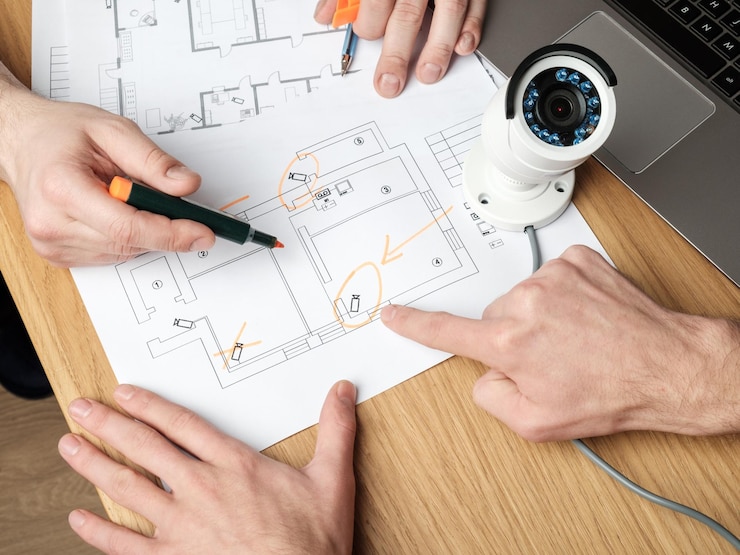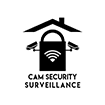If your business aims to improve security, you might consider installing or upgrading your video camera system. Whether you are starting new or growing your current setup, it is important to consider the types of commercial security cameras you need. It would help if you also considered the best places to install them.
In addition to choosing the right commercial security camera system, you should also ensure you install it properly. This is when the need for a professional security camera installer becomes crucial.
This guide will help you know what to consider when choosing a security camera installer. We will also cover the options for your business.
How a Commercial Security Camera Installer Work

CCTV camera installers provide specialized expertise and professional services to ensure businesses receive a well-planned, efficient, and effective security camera installation. Here’s an overview of the services they offer at each process stage.
Initial Survey
A thorough property assessment is the first step in any business security camera installation. A security camera installer will work with your security team.
They will learn about your security goals. Then, they will survey your business’s inside, outside, and perimeter. The installer identifies vulnerable areas, such as locations with limited access or visibility, high-security zones, and entrances where monitoring access is crucial.
After the survey, the installer gives a report. This report shows the areas that need coverage. It also lists the required cameras and suggests where to place them.
Equipment Recommendations
CCTV camera installers know a lot about different security settings. They can suggest the best equipment for your business. They aim to maximize coverage with the fewest cameras, ensuring efficiency while meeting security needs.
When recommending camera types, they consider factors like lighting conditions, maintenance access, and aesthetic concerns. For example, they recommend using small dome cameras in public areas. These cameras can better blend in with the building’s design than larger bullet cameras.
Infrastructure and Network Assessment
A critical aspect of a commercial security camera installation is the assessment of infrastructure and network requirements. Installers evaluate the options for powering and connecting the cameras, whether through dedicated security camera cabling or an existing data or wireless network.
When installing IP cameras, experts often suggest using Power-over-Ethernet (PoE) to connect them to a data network. This setup reduces infrastructure costs and increases scalability, allowing for easier expansion or relocation of cameras without the need for additional cabling. The installer will ensure the network has the capacity and capacity to handle the video data traffic.
If you like analogue cameras because of budget or infrastructure limits, the installer can connect them to a network. This allows video storage and analysis using a digital video recorder (DVR). The system installer will also consider whether your security management software and database should be stored on-premises or hosted in the cloud. Cloud-based systems offer greater flexibility, enabling security teams to access camera feeds from any internet-connected device.
Integration Recommendations
During the initial assessment, the installer may identify opportunities to integrate your CCTV system with other security systems, such as access control or motion sensors. Integrating these systems can strengthen your overall security setup, allowing you to manage everything from one central dashboard.
For example, you can integrate motion sensors with your CCTV system in high-risk areas to trigger alerts and automatic recording when movement occurs, enhancing the effectiveness of your surveillance system.
Detailed Planning and Estimating
Following the assessment, the installer provides a detailed plan that outlines the entire business security camera installation. This includes camera positions, infrastructure layout, equipment specifications, estimated costs, and a provisional installation timeline.
Security Camera Installation
Once the plan is in place, professional commercial security camera installers begin the installation process, adhering to industry standards and building regulations. They strategically place cameras in the optimal positions to ensure maximum coverage and connect them to the necessary cables or networks.
After powering the cameras, the installer checks for coverage and image quality, making any adjustments needed for more apparent surveillance. Installers collaborate closely with IT and security teams to manage connectivity and ensure the system meets expectations. For cloud-hosted systems they confirm network connections before completing the setup.
Before finalizing the installation, they test the entire system and provide training to the security team to ensure they know how to operate the new cameras.
Compliance Management
Your CCTV system may be required to adhere to specific local, state, or federal rules and privacy laws, depending on the property’s location and the sector in which you conduct your business. Professional installers are well-versed in these regulations and ensure the installation complies with all legal standards.
Service and Maintenance
Regularly maintaining your CCTV system is crucial to prevent any interruption in your video surveillance. The company that installs your system is usually the best choice for maintenance. They know the equipment well and understand any environmental issues that might affect performance.
Trained installers perform routine maintenance following manufacturers’ guidelines, including any necessary software updates to keep your system secure. If issues arise, they troubleshoot and repair as needed to keep the system functioning smoothly.
System Upgrades and Changes
As your security needs evolve, your CCTV system may require upgrades or adjustments. A professional security camera installer can add new cameras or relocate existing ones to meet changing requirements. They can also implement the latest features and updates, ensuring your security system remains state-of-the-art.
Ongoing Maintenance and Support
A reliable security camera installer continues beyond installation. They will be available for ongoing maintenance and troubleshooting if issues arise. If a camera stops working, needs a software update, or requires relocation, a professional installer can help. They will make sure your system stays fully operational.
Installers provide system updates to keep your hardware and software current. This helps your business stay safe with the latest technology. If you need changes, like moving a camera or adjusting the system, the installer can help. They will make sure you can monitor your security feeds smoothly.
How to Find the Best Commercial Security Camera Installer for Your Next Installation?
Choosing the right installer is important when you install security cameras for a school, store, or city. The right commercial security camera installer must understand your industry and the unique needs of your business. They should be able to address shared security vulnerabilities and recommend cameras that can protect critical assets effectively.
To help you select the right installer, here are eight important questions to ask:
How Many Cameras Do I Need to Install?
The number of cameras you need depends mainly on your budget and the specific areas you want to cover. Your installer should guide you on maximizing coverage with the resources available. For example, they recommend adding cloud-connected cameras to your current security system. This can lower installation costs instead of replacing the whole system.
What Type of Cameras Do I Need?
The ideal camera type will depend on the security requirements of your business. A good installer should tailor their recommendations to fit your unique needs. For example:
Commercial office security teams might need remote-access cameras to monitor the premises outside working hours.
High-security facilities may require night-vision and PTZ (pan, tilt, zoom) cameras to monitor access points 24/7.
Retail stores may benefit from bullet cameras positioned at entrances for detailed monitoring.
Asking questions about camera types, resolution, and features is essential. For example, you can ask about facial recognition and whether the camera is wireless or hardwired. This will help you see if the installer can offer the right solutions.
Are Your Cameras Compliant with My Industry’s Standards?
Ensure that the security cameras comply with both universal and sector-specific rules. For example, cameras in federal government buildings may need to follow FIPS rules for data security. Always ask about rules like the FCC (Federal Communications Commission) or NDAA (National Defense Authorization Act). This helps make sure your system follows legal requirements.
How Simple is it to Enhance or Update My Security Camera System?
To future-proof your system, consider scalability. If your business plans to expand or add new locations, ensure your camera system can accommodate the growth. A scalable system lets you manage many sites from one platform. You don’t need extra infrastructure. This makes it easier to add cameras and networks when required.
Do Your Cameras Offer Analytics?
Smart security systems with analytics can significantly enhance your overall strategy. Ask about features like motion detection, vehicle categorization, and license plate recognition for areas like parking garages. Visitor management analytics can also provide valuable insights for managing occupancy and improving energy efficiency through HVAC and lighting adjustments.
Can I Use My Current Software with Newly Acquired Cameras?
If you already have a system, ask the installer if they can add new cameras. This way, you won’t have to start over. You can save money by not removing and replacing your whole security system.
Do You Offer Ongoing Support?
Security camera systems require maintenance and support for software upgrades, health checks, and emergency responses. Ask the installer if they provide ongoing support. This support can help with camera problems, vandalism, or theft. Immediate support is crucial in times of emergency or system failure.
What Are My Warranty and Insurance Options?
A reliable commercial security camera installation should serve your business for years. Discuss maintenance, servicing, and support options before installation. Ask about warranty conditions, such as coverage for malfunctioning equipment and liability for any security breaches caused by faulty installations.
Installers usually provide a one-year warranty on installation materials like cabling and weatherproofing. Depending on the product, Hardware warranties can last 3 to 5 years. Be sure the installer provides ongoing technical support to ensure system longevity.
Finally, talk about insurance options that cover property damage during installation. Also, consider options that compensate for delays or if the installation does not meet specifications.
Need a Commercial Security Camera Installer for your Business?
Installing business security cameras is complex and requires extensive knowledge and experience, so hiring a professional is always advisable. The questions above can help you find a business security camera expert. They will support you from start to finish. This includes creating a custom solution and maintaining your equipment for years.








